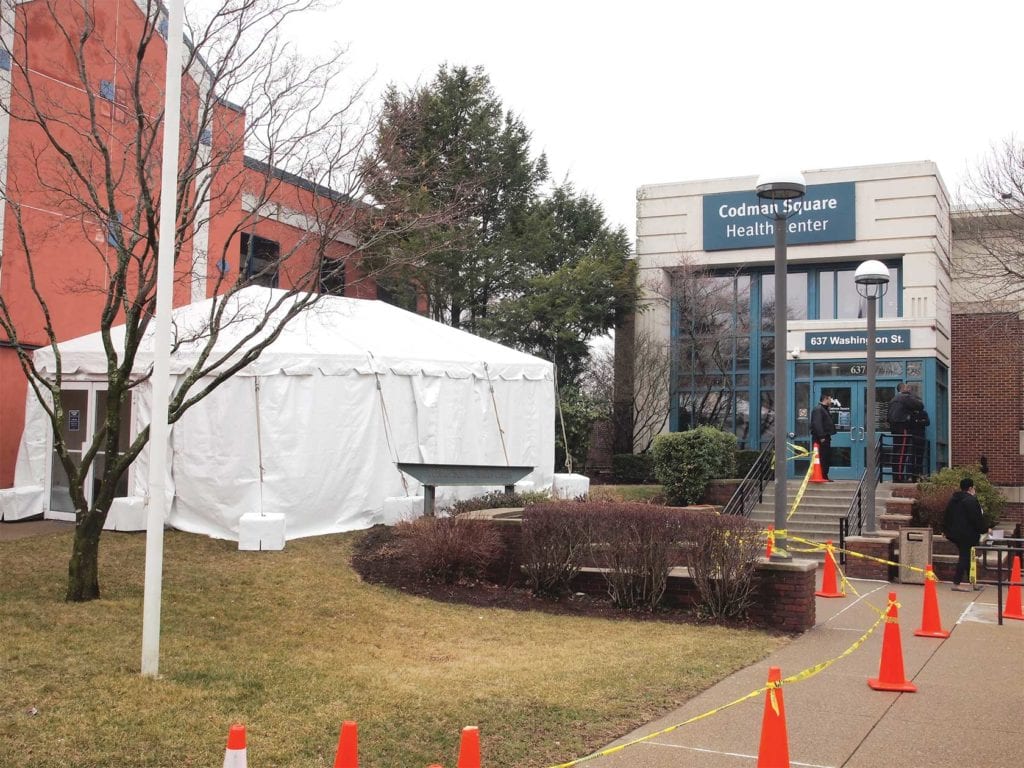
Community health centers in Massachusetts are feeling financial pressure from the COVID-19 pandemic, so much so that advocates say the centers need more state and federal assistance to stay open.
The small nonprofits deliver care to many underserved patients on MassHealth, Medicare or without health insurance. In Massachusetts, where the first community health center in the country was established more than five decades ago, 52 centers serve about one million people, about a seventh of the state’s population.
In the best of times, community health centers operate on tight margins financed mostly by revenue from patient services and grants. But the coronavirus outbreak is forcing health centers to shift from primary care, dentistry, optometric and chronic illness management services to urgent care. The subsequent decrease in patient service revenue, advocates say, makes their ability to withstand the outbreak tenuous.
“We’re trying to make sure that we stay in the fight to combat the spread of this disease, especially for this vulnerable population, and it’s having a dramatic effect on us,” said Stan McClaren, chief executive officer of Dorchester’s Harvard Street Neighborhood Health Center.
The coronavirus outbreak is forcing health centers like his to adopt new ways of operating with less revenue and less staff.
“We provide a lot of preventative care that allows the hospitals not to be deluged with a bunch of folks showing up in the emergency rooms, which is the most expensive type of care, so health centers save the health care systems quite a bit,” McClaren said. “During normal times, we’re the buffer. But during these times, it’s extremely critical that we’re here to be the buffer.”
In-person check-ups have been postponed or replaced by virtual telehealth appointments. Dental and eye care — revenue-generating services — have been shut down to ensure safety. The remaining staff, in some facilities, have rationed personal protective gear as they screen or test patients for signs of sickness.
“We’re seeing a precipitous decline in the number of patients,” said James Hunt, president of the Massachusetts League of Community Health Centers. “We know that there will be a surge. We’re trying to maintain our staffs and trying to respond to the pandemic.”
The federal government has already sent $2.5 million to the state’s 38 federally-qualified health centers under the coronavirus relief bill signed by President Donald Trump on March 6. The other 14 centers are licensed through hospitals, or affiliated with the federal designees.
Hunt said that while that cash infusion was helpful, “we believe there will be further need of community health centers in the weeks and months to come.”
More federal funds are on the way through the coronavirus spending bill signed by the president on March 27. The measure contains $1.32 billion for the nation’s nearly 1400 community health centers, but it’s not clear how much of that will come to Massachusetts.
The state has also begun taking action to support the cash-strapped centers, earning praise from advocates even as they ask for more.
Last month, Gov. Charlie Baker signed an order requiring insurers to cover “medically necessary” COVID-19 related services delivered via telehealth. MassHealth will also reimburse health centers for services rendered through telehealth at the same rate as in-person visits. The changes allow health centers to collect revenue when virtually delivering care, keeping patients out of harm’s way.
“I think that we would all agree we’ve made more progress in telehealth in the last few weeks than we’ve made in the last several years,” said Christina Severin, chief executive officer of Community Care Cooperative. The federally-recognized cooperative, which was recently awarded $1 million in private funds to further expand telehealth capacity, is composed of 19 health centers across the state.
Even though telehealth services are emerging as a pandemic workaround for chronic disease management, health center workers say they have their limits, especially for patients without access to a phone, the internet or a computer.
“A telehealth visit will not be exactly like a face-to-face visit, and I think that understanding what things telehealth cannot do — that’s going to be important now,” said Dr. Julita Mir, chief medical officer of Community Care.
And patients will eventually need to go in for pharmacy prescriptions or medical procedures like blood tests.
McClaren said that telehealth helps financially, but will not make up difference in revenue Harvard Street gets from its regular operations.
He said he and the organization’s board are trying hard to keep the doors open and continue serving Dorchester, Roxbury and Mattapan.
“And if you’re thinking about the lives that we’re dealing with, people with co-morbidities that are more susceptible, it’s going to have a dire consequence if we just sit back and do nothing,” McClaren said.
Saraya Wintersmith covers Dorchester, Roxbury and Mattapan for WGBH News 89.7.






